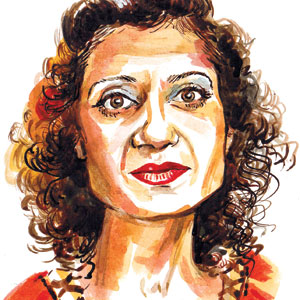The poverty of excess

One of my early memories is being really distressed about the front cover of my sister’s teacher training book – ironically called ‘Children in Distress’. It featured a scrawny-looking child with a greying white dress and a dirty face, holding her head and crying. Poverty was synonymous with emaciation and malnourishment, and this image epitomised this.
Years later, my brother, while at medical school, completed a project on the association between poverty and failure to thrive. As a young teenager, I became one of his subjects, coming in under the second centile for both height and weight. It wasn’t until after I left home to go to university that I grew another five centimetres because my vegetarian diet wasn’t being restricted by a diet of chapattis and curry sauce.
But when I see poverty now, I no longer see these images. I see morbidly obese children being diagnosed with type 2 diabetes and vitamin deficiencies, because despite their appearances of excess, they are likely to be malnourished in essential micro-nutrients.
What society and the medical profession fails to embody is that obesity is far more complex than the simple mantra of eating less and moving more. It is likely to be associated with poverty and low socio-economic status; a reversal of the previous trend of poverty being linked with being underweight.
Next time you think or say anything about obesity, ask yourself, would you use the same phrases for someone who was being treated for anorexia nervosa?
One reason is that junk food is significantly cheaper than healthy food. When I take my three kids to the mall, I can feed them all for under £10 at McDonalds, whereas stocking up on a healthy salad and fresh fruit from the M&S café would cost me twice that. Rather than adopting an authoritarian junk food tax, we should be subsiding healthy food for all – an ideal I fear will remain a distant pipe dream with the advent of Brexit and restricted European food trade.
Apart from the economic reasons for eating junk food, there are also psychological ones. It is a continual mystery to me why obesity is not viewed as an eating disorder, when anorexia and morbid obesity are two ends of the same spectrum. Many people who are obese are addicted to food, and like any other addiction, the drug of choice is being used as a band-aid for any number of painful and traumatic events, as well as compensating for feelings of low mood and anxiety.
And let’s not forget the biology of this. We are all genetically programmed to have a certain body shape as well as an appetite ‘off switch’, and genes are kinder to some than others. This genetic variation combined with an obesogenic environment amplifies the risk factors for obesity.
Despite most healthcare professionals being aware of the multi-factorial causes for obesity, I still hear lots of dismissive and judgmental comments about this patient group. So next time you think or say anything about obesity, ask yourself, would you use the same phrases for someone who was being treated for anorexia nervosa?
Because that emaciated child on the front cover of ‘Children in Distress’ should now be replaced by a morbidly obese child, eating for comfort, for a multitude of biological, social and psychological reasons.
Dr Shaba Nabi is a GP trainer in Bristol. Read more of Dr Nabi’s blogs online at pulsetoday.co.uk/nabi
Pulse July survey
Take our July 2025 survey to potentially win £1.000 worth of tokens











